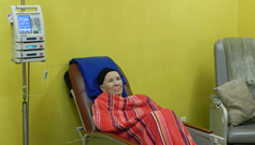Targeted Therapy
A targeted therapy is one that is designed to treat only the cancer cells and minimize damage to normal, healthy cells. Cancer treatments that “target” cancer cells may offer the advantage of reduced treatment-related side effects and improved outcomes.
Conventional cancer treatments, such as chemotherapy and radiation therapy, cannot distinguish between cancer cells and healthy cells. Consequently, healthy cells are commonly damaged in the process of treating the cancer, which results in side effects. Chemotherapy damages rapidly dividing cells, a hallmark trait of cancer cells. In the process, healthy cells that are also rapidly dividing, such as blood cells and the cells lining the mouth and GI tract are also damaged. Radiation therapy kills some healthy cells that are in the path of the radiation or near the cancer being treated. Newer radiation therapy techniques can reduce, but not eliminate this damage. Treatment-related damage to healthy cells leads to complications of treatment, or side effects. These side effects may be severe, reducing a patient's quality of life, compromising their ability to receive their full, prescribed treatment, and sometimes, limiting their chance for an optimal outcome from treatment.
To learn more about personalized cancer care, visit www.plwc.org


